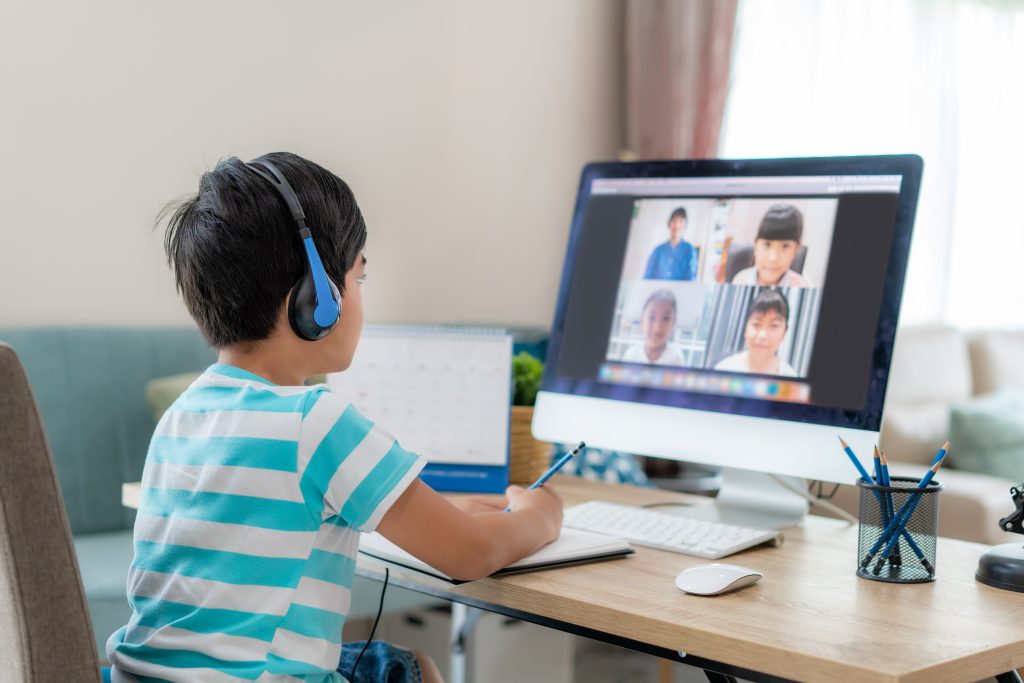
As children are forced to revert to online learning, parents need to be aware of how much more time children spend online. Without much else to do at home during the covid season, children are online not only to gain knowledge but also to play and socialise with friends.
With increased online time, also comes increased exposure to potentially unsafe online threats. While the focus isn’t to create more fear, parents still need to be aware that there could be people on the internet who mean harm. These threats include invasions of privacy, cyberbullying, sexting and harassment. It doesn’t matter whether they are young children or even teens. As long as children are exposed to the internet, parents should treat the digital world like how they would treat any public space.
Here are some ways to equip your children with the necessary cybersecurity skills so that they can protect themselves when you’re busy or occupied:
#1. Explaining Internet Safety
Educate your children on the possible online risks that they might face. This means that as parents, we also need to know these risks beforehand. By keeping up-to-date with the latest technologies, apps and social trends, you’ll be better prepared for the questions that come later.
A couple of things to talk about (age-appropriate of course):
- Dangerous or inappropriate websites
- Malware and how they can accidentally download it onto computers and phones
- Online frauds and scams
- Sexual predators
Ensure them that their safety is what matters to you. Remember to keep an open conversation and answer questions patiently. By being accessible to your children, it will allow them to feel more open about sharing any uncomfortable things should they encounter online later. It will also clue you in on how your children use the internet.
#2. Lay down the ground rules
Before handing any device to any child, parents should always set some ground rules.
- Never give out personal information, including your name, home address, ic number and phone number.
- Never post your photos on public sites of any kind.
- Do not chat with strangers.
- Do not open an email from someone you do not know.
- Do not respond to hurtful, insulting or bullying messages.
- Report any inappropriate messages to a trusted adult.
- Never agree to meet up with someone you’ve only met online.
- Parents need to limit the types of apps and duration of use.
#3. Teach them to speak up
Build your children into bold and confident individuals who would speak up if something made them uncomfortable. Grooming and child predators always thrive on secrecy, which is why it is not enough for children to tell right from wrong. They need to be brave enough to speak up. They need to know that threats like this are NEVER their fault.
Likewise, parents need to become better listeners. Children need to know that they can always turn to their parents for solutions and have a safe space to discuss anything.
#4. Your role as a parent
So aside from educating, setting the rules, and building confidence, what else can you do? You can:
- Ensure that your children’s computer is in a common area so that you can monitor their activity.
- Perform regular checks on your child’s browser history
- Install security software and tools or install apps with parental control. There are plenty of programs that notify parents on what their children are doing on their devices.
- Turn on privacy features on all devices.
- Make a point to know your children’s passwords, although some parents might feel strongly about this.
But the most important of all is to be alert for any sudden changes in your child’s behaviour. This is usually the best indicator for cyberbullying or possible association with an online sexual predator.
#5. Some of the apps that can help
For parents who simply cannot find the time to monitor everything that their children do online, there are plenty of apps and platforms that can help you to keep track. Of course, no parental-control service is flawless, and you will have to pay for the good ones.
Of course, plenty of antivirus products also come with parental controls built-in. However, their features are usually very basic and don’t allow much flexibility. Worthy mentions include Net Nanny and Norton Family. Net Nanny is capable of web filtering, location tracking and app management on both Android and iOS devices. It also works on Amazon Kindle Fire tablets, on Windows and Mac and on Chrome OS devices that support Google Play. Norton Family, on the other hand, cannot support IOS and Macs.
Suppose you’re on a tight budget, then Kaspersky Safe Kids might be the one for you. Even on the free edition, the service offers web monitoring, and parents can adjust time limits along with app management. If you want more features, then you’ll have to pay for their paid plan. But the good news is that you’ll be able to use the service on an unlimited number of devices, including PCs and Macs.
A most common free one that parents tend to use in conjunction with online google classrooms is Google Family Link. With Google Family Link, parents can set digital ground rules remotely from their own device. Parents also can decide when their child is ready to handle their own devices as there is no age limit for Google Family Link. There are plenty of settings and parents can read up on the full features on the internet, but here are some of the features that are there by default:
- Parents have control over purchases and downloads on Google Play store.
- Music labelled “explicit” will be blocked.
- Parents have full control over their children’s search options on Google, their ability to share photos, and the duration time spent on their devices.
- Parents can turn on notifications so that they can monitor what their children are doing on their devices.
So, do check out all your options before committing. You will find that there are plenty of options, even though there seem to be a lot more for Andriod and non-Mac users.
In closing
With more and more parents struggling to work from home in this season, we must admit that we cannot monitor our children’s online activities all the time. However, we can equip them with the necessary knowledge and skills so that they can protect themselves in the digital world. Cyberthreats are real, and even though your children are safe behind closed doors, you should never underestimate the threats the internet can bring. So, make sure you educate your children on the risks, and we hope you will find these tips helpful.

